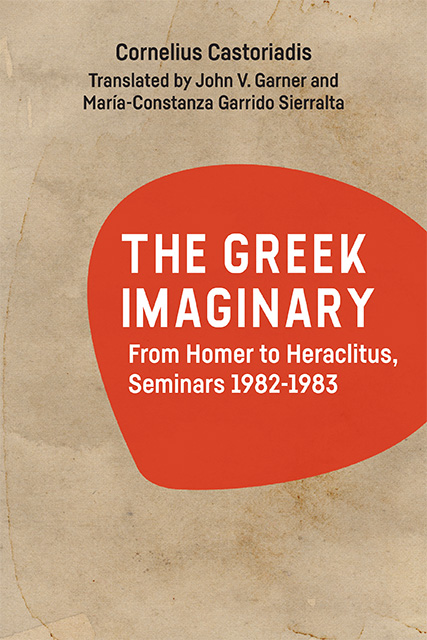Appendix C - Castoriadis and Ancient Greece
Published online by Cambridge University Press: 20 October 2023
Summary
Castoriadis was a theorist of self-creation; and self-creation, which he himself came to exemplify through his life and work, is what he found in the Greek polis, particularly, of course, in Athens.
In presenting Cornelius Castoriadis’s candidacy to the School for Advanced Studies in Social Sciences [EHESS] several years ago, I told the following anecdote. A famous professor of Roman law was one day in Ferney when d’Alembert was there. Wanting to express his admiration for Voltaire, he said the following to the editor of the Encyclopedia: “It is only in Roman Law that I find him a little weak.” “That is exactly my opinion,” replied d’Alembert, “with regard to mathematics.” I made it clear that such was not my opinion with regard to the relationship Castoriadis had with ancient Greece. I could discuss Plato and Aeschylus with him on equal footing.
I became acquainted with the journal in which he wrote, Socialisme ou Barbarie, towards the end of 1956 or at the beginning of 1957 following the Hungarian revolution and the repression that brought about its end. But it was a bit later before I understood that what Castoriadis meant by “socialism,” and what he later called the self-institution of society, owed much to the ideal of Athenian democracy as represented in a positive manner by the Funeral Oration that Thucydides gives to Pericles; or by the narrative developed by Protagoras in the Platonic dialogue named after this great sophist; or, in a negative way, by the Constitution of the Athenians by Pseudo-Xenophon, whom we label the Old Oligarch in our jargon.
It was 1958 when I first made contact with the group that edited the journal. And it doesn’t really matter that these members later became “dissidents,” seeing as they were Jean-Francois Lyotard and Pierre Souyri. I must admit that back then I considered Athenian “democracy” as largely bogus, since it did not include women, metics, and slaves. Souyri then told me: “You know that the Athenian peasants, when something that really interested them was being debated, all came to the people’s assembly, the Ekklēsia.”
- Type
- Chapter
- Information
- The Greek ImaginaryFrom Homer to Heraclitus, Seminars 1982-1983, pp. 285 - 298Publisher: Edinburgh University PressPrint publication year: 2023



